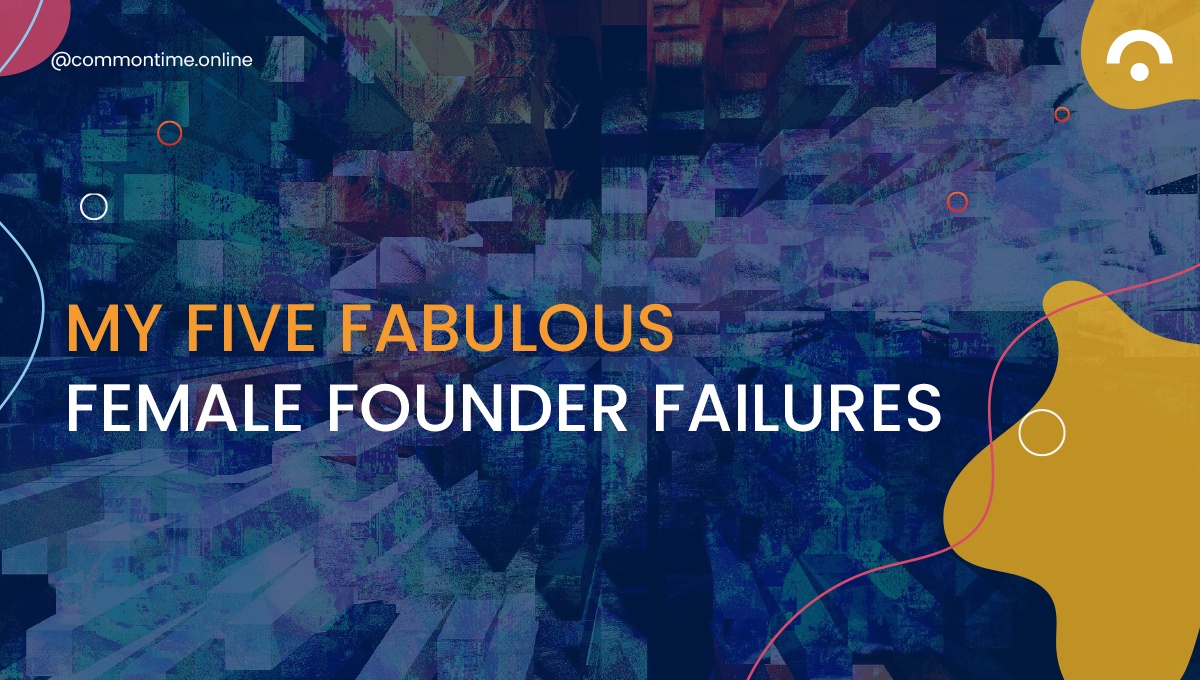Before, during, and after Fame and Fortune are copious amounts of Failure. I will be using this “F” word often in this article.
As a founder, I have had some fantastic failures, and I will continue to have them. Back when I was pursuing my Master of Arts Administration at the University of Kentucky, a required reading was Michael Kaiser’s The Art of the Turnaround. One of his ten golden rules for a successful arts organization turnaround is rule number 7: “There must be only one spokesman, and the message must be positive.”
My sister once remarked, “That’s you, Be Positive, just like your blood type…” This sibling repartee happened when I requested that she put a positive spin on a negative conversation. In hindsight, she was right (as sometimes siblings are). She owned the conversation and I just needed to listen.
Reflection and accountability are beautiful things. I hope that my failures stop you, founder-reader, from making the same mistakes and serve as a learning opportunity.
My top 5 failures are:
- Don’t trust implicitly.
- There’s an app for that?
- You don’t need to win the popularity contest.
- Avoid expensive advice.
- Optimism isn’t an outcome.
Failure 1 - Beware of the missing footfall…
Recently, CommonTime was a vendor/sponsor at a three-day religious festival. A trusted advisor to our company convinced us of how great it would be for exposure, conversions, and potential sales. The presenters projected astoundingly high footfall: easily 25,000 people. CommonTime was ready to give it our all. Marketing materials were made, banners and posters were hung, artists were on standby, and runners were primed to distribute cards and facilitate sign-ups. It was money that I thought would be well spent. The outcome? A dud on day one, dead by day three. The presenters argued our perspective of the lack of footfall – the magic stampede somehow avoided the vendors stalls. Eight signups. No conversions. According to a security guard who estimated the total number of vehicles in one part of a parking lot, the astoundingly high footfall was in reality 2,000 people.
Learning outcome from failure 1: Trust, but do your due diligence. Gather data and testimonials and make sure that the venue, theme, and target audience is a home run for your sponsorship and your efforts.
Failure 2 - An app will get you in the market faster – or not…
In our eagerness to live our mission and connect even more artists to learners, we believed an app would be a necessary early step. We received an affordable quote from a new app startup; they promised us a short turnaround time – four months – and had a strong start to the app development and customer service. After three months, communication became nominal. When we were shown the app for a review, we didn’t know what we were looking at. Fourteen months later, we had a partial and buggy app running off of a database built separately from the website without our knowledge. The cost of a new app ranged from $50,000 to $250,000. We will have to start from scratch but will rely on our closest network. The motto of the company we chose was “Machines make it better.” That was where I should have turned back. No, humans make it better – always.
Learning outcome from failure 2: Discuss and decide collectively on an app developer with your IT developer. Outline a project plan with clear deliverables and meetings up front. Remember learning outcome 1: gather data and testimonials – check out their code and frequency of communication. Don’t forget to test their other apps!
Failure 3 - You oughta be in pictures…
We love our brand. Many of our clients and customers love our brand. Our creatives, social media, reels, and testimonials are all wonderful and reflective of the work we do. Our SEO and social media often outperform our competitors… in popularity contests. We were spending so many hours on awareness that we weren’t focusing on selling our mission and our best product: our teaching artists.
In this approach, our social media was like a driftnet in the ocean, rarely catching what we needed: more customers. Some great advice we’ve received from Mark Walmsley of the Arts & Culture Network is to identify your preferred social media platform and then hyper-target your client base. He wasn’t the only one singing that song to us. We needed to speak to our best client – the ones that can connect to us, who are connected to us – and let them sell our mission and product.
Learning outcome from failure 3: All that glitters isn’t gold. What is truly golden are those who trusted you from day one, believed in you and your product and mission, and helped you build from the early days. Grow from them instead of playing the numbers game, and keep cultivating similar clients. It’s just like my sister taught me: learn to listen, even if it is a negative conversation. Find a target you can hit.
Failure 4 - It’s good advice that maybe you just shouldn’t take…
Founders will never be at a loss to receive advice, but don’t let it cost you too much money. Having an advisory board for any startup is key, but also hold them responsible if they are giving advice that is beyond what you, your team, or your finances can deliver. They are there to roll up their sleeves alongside you and get you to a sustainable level, or to a point where you are attractive to investors. They are there to help you get your product to market. If you are receiving advice, but those offering it don’t buy your product, or get you the leads and contacts to further your business, give them a pass. Because your time as a founder and your team’s time has value.
Learning outcome from failure 4: Take the advice that you know is beneficial to the growth of your startup, with the caveat that those offering cost-inducing advice need to have skin in the game of your startup’s success. Advice should help fill the gaps in your strengths. Your advisory board should help motivate and mentor your team, and you, to be the best for your company’s growth.
Failure 5 -Put on a happy face…
Be positive but be realistic. Optimism is needed for anyone, especially for founders and their startups. But don’t let the optimism blind you to the fact that you aren’t clear on your product or sales. Optimism says, “don’t give up!” However, a bootstrapped startup needs a time limit on when to move on to a sale that sticks or to stop, re-evaluate, and pivot. Don’t be afraid to be transparent to the team when the going gets tough and get their input to navigate the bumpy road.
Learning outcome from failure 5: Weigh whether a small success is a sustainable one. If the conversion was too costly in time and money, is that really a client you want to pursue? Persevere with consistent positive outcomes. In the early days of your startup, place a salesperson centerstage of all product development in lockstep with a strategic marketing plan. We should have done this, but we didn’t.
Accept your failures, learn, adapt, and move on
One of the most freeing (albeit fraught) failures was running out of runway. It was a critical moment to reflect on what was working and what really wasn’t. The necessary decision was to streamline, become agile and focus only on what resulted in repeatable sales through a dedicated group of customers and providers. The ones that have been there throughout, and who are now bringing in new clients, new ideas, and more sales.
Above all, fail without shame
I leave you with this quote from Teddy Roosevelt – used beautifully in Brenné Brown’s 99U talk, “Why Your Critics aren’t the Ones who Count.”
“It is not the critic who counts; not the man who points out how the strong man stumbles, or where the doer of deeds could have done them better. The credit belongs to the man who is actually in the arena, whose face is marred by dust and sweat and blood; who strives valiantly; who errs, who comes short again and again, because there is no effort without error and shortcoming; but who does actually strive to do the deeds; who knows great enthusiasms, the great devotions; who spends himself in a worthy cause; who at the best knows in the end the triumph of high achievement, and who at the worst, if he fails, at least fails while daring greatly, so that his place shall never be with those cold and timid souls who neither know victory nor defeat.”
- from “Citizenship in a Republic,” Theodore Roosevelt’s 1910 speech also known as “The Man in the Arena,”
So, dear female founder colleagues, fail fabulously throughout your journey of fame and fortune – whatever that means to you. Embrace your “F” word often. It isn’t because you are fragile, it’s because YOU are a fantastic force for positive change. Learn, listen, adapt, improve, and move on. Giving up isn’t an option.
There is no shame in failure – only learning.



